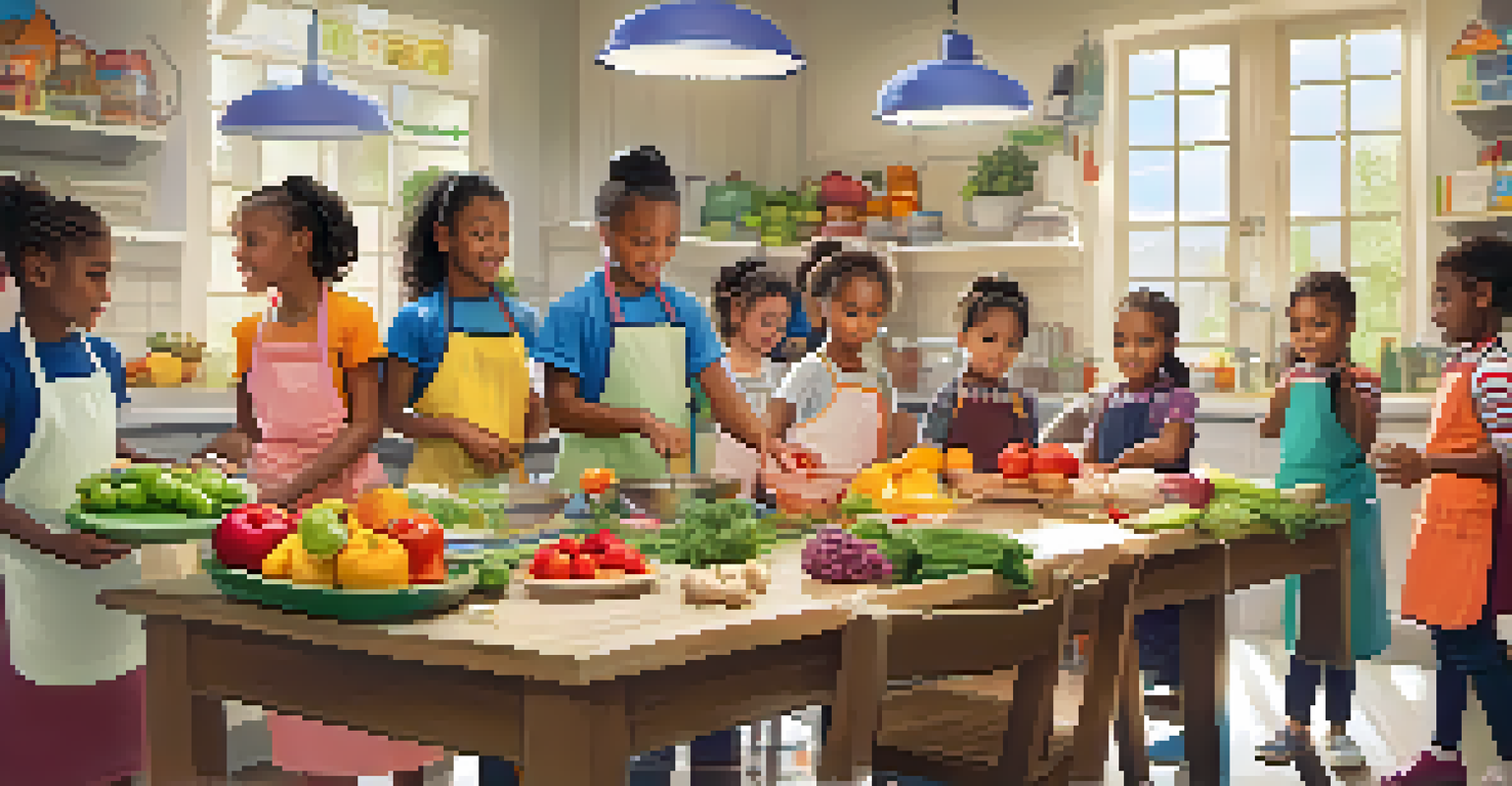The Importance of Cooking Skills in Pediatric Nutrition

Understanding Pediatric Nutrition: Why It Matters
Pediatric nutrition is crucial for children's growth and development. Proper nutrition supports their physical growth, cognitive function, and overall health. Without adequate nutritional intake, children may face developmental delays and health issues.
Let food be thy medicine and medicine be thy food.
Cooking skills can significantly impact a child's nutritional choices. When children learn to prepare their meals, they become more mindful of what they eat and how it affects their bodies. This understanding fosters a lifelong appreciation for healthy eating habits.
Moreover, engaging children in cooking can make nutritious foods more appealing. The act of preparing a meal can spark their interest in various ingredients, encouraging them to try new flavors and textures that they might otherwise avoid.
Building Confidence Through Cooking Skills
Teaching children to cook builds their confidence in the kitchen and beyond. When kids can prepare their meals, they gain a sense of achievement and independence. This newfound confidence can translate into other areas of their lives, including school and social interactions.

Moreover, cooking encourages problem-solving and creativity. Children learn to follow recipes, measure ingredients, and adjust flavors, which helps develop critical thinking skills. These experiences can be invaluable as they face challenges in other subjects or activities.
Cooking Skills Boost Confidence
Teaching children to cook fosters independence and problem-solving skills, enhancing their overall confidence.
Additionally, cooking together as a family nurtures bonding time. This shared experience not only strengthens relationships but also reinforces positive attitudes toward healthy eating. Families that cook together often create lasting memories while instilling essential life skills.
Fostering Healthy Eating Habits Early On
Cooking skills are instrumental in promoting healthy eating habits from a young age. When children actively participate in meal preparation, they are more likely to choose healthier options. This proactive approach helps combat childhood obesity and related health issues.
Cooking is like love. It should be entered into with abandon or not at all.
By involving children in cooking, parents can educate them about nutrition and the benefits of different food groups. For instance, discussing the importance of fruits and vegetables while preparing a colorful salad makes learning fun and interactive.
Establishing these healthy habits early sets the stage for a lifetime of nutritious choices. Children who learn to cook and appreciate healthy foods are more likely to carry these habits into adulthood, creating a positive cycle of health and well-being.
Promoting Cultural Awareness Through Cooking
Cooking can be a wonderful way to introduce children to various cultures and cuisines. Exploring different recipes helps kids appreciate diversity and understand the importance of food in various cultures. This exposure can foster open-mindedness and creativity.
As families prepare dishes from around the world, they create opportunities to discuss cultural traditions. This not only enriches their understanding of global perspectives but also enhances their culinary skills. It’s a fun way to learn about geography, history, and social studies through food.
Healthy Eating Starts Early
Involving children in meal preparation encourages healthier food choices and establishes lifelong nutritious habits.
Additionally, incorporating cultural dishes into regular meals can make mealtime exciting for children. They can develop a taste for new flavors while learning to respect and celebrate different cultures. This appreciation can lead to a more inclusive mindset as they grow.
Encouraging Mindful Eating Through Cooking
Cooking at home allows families to practice mindful eating, which is essential for developing a healthy relationship with food. When children are involved in the cooking process, they become more aware of what goes into their meals. This awareness encourages them to appreciate the flavors and textures of their food.
Mindful eating also involves paying attention to hunger and fullness cues. Teaching children to recognize these signals while cooking helps them develop better self-regulation. This practice can prevent overeating and promote healthier portion sizes.
Moreover, cooking together creates a relaxed environment for discussions about food choices. Families can share their thoughts on nutrition and healthy habits, reinforcing the importance of mindful eating. This open communication cultivates a positive atmosphere around food.
The Role of Schools in Teaching Cooking Skills
Schools play a crucial role in instilling cooking skills in children. By incorporating cooking classes into the curriculum, educators can equip students with essential life skills. These classes can teach children how to prepare simple, nutritious meals on a budget.
Furthermore, schools can partner with local farms or organizations to provide fresh ingredients for cooking lessons. This connection to local food sources can enhance children's understanding of where their food comes from. It also promotes sustainability and supports community engagement.
Cultural Awareness Through Food
Exploring diverse cuisines while cooking helps children appreciate different cultures and promotes an inclusive mindset.
Incorporating cooking skills into school programs can also address food insecurity. Teaching students to cook healthy meals from scratch empowers them to make better dietary choices, regardless of their economic background. This education can lead to healthier communities overall.
Overcoming Barriers to Teaching Cooking Skills
While the benefits of cooking skills in pediatric nutrition are clear, there are barriers to teaching these skills. Busy schedules and lack of access to resources can make it difficult for families to prioritize cooking. However, small changes can make a significant difference.
For instance, parents can start by involving children in meal planning and grocery shopping. This simple act can ignite interest in cooking without requiring a significant time commitment. Gradually introducing cooking tasks can make the learning process more manageable.

Additionally, community programs and online resources can provide support for families looking to enhance their cooking skills. Workshops and cooking classes can equip parents and children with the knowledge they need. Overcoming these barriers opens the door to healthier eating habits.